|
|
|
Sort Order |
|
|
|
Items / Page
|
|
|
|
|
|
|
| Srl | Item |
| 1 |
ID:
185552
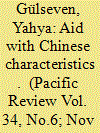

|
|
|
|
|
| Summary/Abstract |
China’s growing foreign aid program in recent years has sparked many debates on alternative development cooperation approaches and practices. ‘Aid with Chinese characteristics’ is often approached with skepticism in the West and considered as posing challenges to the traditional aid architecture. The more optimistic perspectives see China’s emergence as a major donor in a more positive light because it offers an alternative development cooperation model for aid recipient countries, contesting the hegemony of the neoliberal development model. While analysts have mostly focused on whether ‘aid with Chinese characteristics’ is a good or bad alternative, few have questioned its novelty and its actual potential as an alternative development cooperation model. From a neo-Gramscian perspective, this study investigates to what extend China, as a major donor, differs from the traditional donors and in how far that its aid model can be understood as representing a counter-hegemonic alternative. The core argument of this study is that ‘aid with Chinese characteristics’ serves the overall objectives and interests of the neoliberal historical bloc, while at the same time it also plays a role in the increasing tensions and competitions within it, between China and the Western countries in the context of the global financial crisis.
|
|
|
|
|
|
|
|
|
|
|
|
|
|
|
|
| 2 |
ID:
185559
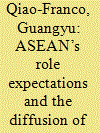

|
|
|
|
|
| Summary/Abstract |
This article examines the diffusion of the principle of ‘common but differentiated responsibilities’ (CBDR) from the United Nations (UN) to the Association of Southeast Asian Nations (ASEAN). Despite its varying interpretations in international negotiations since the 1992 United Nations Framework Convention on Climate Change (UNFCCC), CBDR’s meaning hardly experienced any change in ASEAN. ASEAN’s different interpretation of CBDR from the UN matched the unchanging internal and external role expectations of ASEAN, which were a product of member states’ learning and conditioned by cognitive priors in the region. Cognitive priors in the climate change context included the ‘ASEAN Way’ of collaboration and member states’ deep-seated aspirations for development. The empirical study shows that internally, ASEAN acted as an interactive space for information exchange and a relationship facilitator; externally, it has embraced the position as the voice amplifier for member states in international negotiations. Maintaining the UNFCCC version of CBDR tallied well with ASEAN’s role expectations to: 1) provide member states with room to develop national actions that meet their respective priorities (internal); and 2) put member states in a better position to defend their interests in negotiating adaptation and mitigation responsibilities with extra-regional states (external).
|
|
|
|
|
|
|
|
|
|
|
|
|
|
|
|
| 3 |
ID:
185557
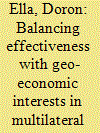

|
|
|
|
|
| Summary/Abstract |
Since its inception in December of 2015, scholars and policy-makers have been debating the motivations behind the design of the AIIB. This paper advances this debate by exploring whether and how the AIIB’s structure follow the design pattern of other leading MDBs, and how well did it manage to integrate institutional effectiveness considerations with promoting its largest shareholders’ geo-economic interests. It does so by comparing the design of the AIIB with that of the ADB and the World Bank, while integrating several approaches to institutional design. I argue that the AIIB’s architects identified certain functional deficiencies in the performance of existing financial institutions and attempted to establish an alternative that will better address these deficiencies. To achieve that, they tried to balance between certain structural features that promote institutional performance with features that promote powerful creditors’ geo-economic interests, as well as invest in AIIB’s attractiveness vis-à-vis other financial institutions. This paper finds that in multilateral development banks power considerations tend to overshadow issues of institutional effectiveness, while sometimes these are successfully integrated. And, that powerful actors are able to politicize certain functional design features and reassign their purpose from solving cooperation problems to advancing geo-economic interests.
|
|
|
|
|
|
|
|
|
|
|
|
|
|
|
|
| 4 |
ID:
185558
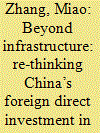

|
|
|
|
|
| Summary/Abstract |
Using a non-state-owned Chinese company LONGi as a case study, this paper analyses the motives, impact and acceptance of Chinese investment in Malaysia. The paper compares Chinese investment in manufacturing sector with the ones in infrastructure sector to obtain a more rigorous assessment than previous studies. In contrast to the narrative depicting Chinese investment into a single superstructure that generates a monolithic and deleterious impact couched under the Belt and Road Initiative, I argue that the motives and impacts of Chinese investment vary significantly with business nature and practices, and thus generating different acceptance level towards Chinese-funded project in host-site. LONGi’s case elucidates why Chinese investment in manufacturing encountered little political upheaval, while BRI projects in infrastructure sectors are often disputed. The analytical benefits and policy implications arising from this specific case study of Malaysia should be helpful to deepen our understanding of Chinese outward investment in not only other emerging economies in ASEAN but also broader region of the Asia-Pacific.
|
|
|
|
|
|
|
|
|
|
|
|
|
|
|
|
| 5 |
ID:
185560


|
|
|
|
|
| Summary/Abstract |
On 16 September 2014, Indonesian lawmakers unanimously agreed to ratify the ASEAN Agreement on Transboundary Haze Pollution (AATHP), becoming the last ASEAN member state to ratify. Eight of the 10 member states had ratified by 2006, and nine had ratified by 2010. Although the ratification bill reached the Indonesian Parliament during the 2000s, it was always disapproved. This article seeks to re-examine Indonesia’s lengthy delay and address its long-awaited ratification. Accordingly, we build on Robert Putnam’s theory of ratification from two-level game theory and develop a framework for analysing delayed ratifications. Although the negotiated AATHP was ‘soft’ and thus low-cost for domestic stakeholders, key domestic stakeholders had little appetite for ratification and limited substantive pressure came from neighbouring governments during the 2000s. However, in the context of heightened public concern and calls for government action and positive palm oil industry responses to international pressures, persistent international pressure and measures during the 2010s, particularly from Singapore, provided parliamentarians with enough incentive to symbolically ratify the agreement. Addressing Indonesia’s delayed ratification is important in understanding ASEAN’s ongoing struggle to combat transboundary haze pollution and offers a useful case study in the still-developing area of ratifications in the environmental regime formation literature.
|
|
|
|
|
|
|
|
|
|
|
|
|
|
|
|
| 6 |
ID:
185551


|
|
|
|
|
| Summary/Abstract |
In the Post New Order period, there was a significant development in Indonesia. The issuance of the Law on TNI in 2004, has since guided how the Indonesian military operates in dealing with external and internal security threats and curbed its socio-political role, which is associated with the New Order regime. However, it has not explicitly touched upon the implementation of defence diplomacy, which has significantly increased within the last decade. Hence, the article aims to analyse the development of Indonesia’s Defence Diplomacy in the Post New Order period, particularly in the context of joint exercises. This article attempts to answer two key questions: ‘How has Indonesia developed its defence diplomacy as part of its overall diplomacy?’ and ‘What factors account for different practices undertaken in Indonesia’s defence diplomacy?’ The article qualitatively scrutinises the development of Indonesia’s defence diplomacy activities of joint exercises by comparing two bilateral exercises with the major powers, the Garuda Shield and the Sharp Knife. In supporting the analysis, the article relies on the combination of interviews and observations performed during fieldwork from July 2018 to July 2019. The article is critical since it offers an alternative approach to studying Indonesia’s defence diplomacy.
|
|
|
|
|
|
|
|
|
|
|
|
|
|
|
|
| 7 |
ID:
185553
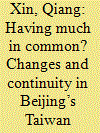

|
|
|
|
|
| Summary/Abstract |
Since the pro-independence Democratic Progressive Party won the 2016 election in Taiwan, Beijing’s Taiwan policies have witnessed some strategic and tactical adjustments. This article attempts to clarify the underlying changes and continuity in Beijing’s Taiwan policy by addressing three vital questions. First, for Beijing, what is the prominent concern for its Taiwan policy making? Second, what is the top priority for its ‘great rejuvenation’ ambition? And third, what is Beijing’s guideline for dealing with Taipei’s reluctance to accept reunification? This paper argues that, firstly, how to prevent Taiwan’s de facto independence from perpetuating has become the primary challenge for Beijing, given Taiwan’s inclination to indefinitely maintain de facto independence. Second, Beijing still prioritizes the achievement of comprehensive modernization before the fulfillment of reunification within its overarching ‘national rejuvenation’ timetable. Third, discouraged by Taiwan’s anti-China dynamics, Beijing has switched its guideline for promoting unification from ‘placing hope on the Taiwanese’ to ‘placing more hope on the mainland itself’.
|
|
|
|
|
|
|
|
|
|
|
|
|
|
|
|
| 8 |
ID:
185555


|
|
|
|
|
| Summary/Abstract |
North Korea’s vulnerability to environmental shocks is an under-appreciated variable in the country’s human insecurity profile. Based on the United Nations Development Programme’s seven pillars of human security and using primary and secondary sources on weather, food and health conditions, the article argues that the intersection of environmental shocks with multiple human insecurities create an exacerbating chain effect on people’s lives in North Korea and prompt adaptive responses from both individuals and the government. We find the regional variations in adaptive capacity as the data shows more people from Hamgyong and Yanggang provinces used outbound migration as an option to survive than other areas, mediated by geography and gender. While Kim Jong Il largely failed to respond to human security threats, Kim Jong Un has adopted a few limited measures to mitigate further damages.
|
|
|
|
|
|
|
|
|
|
|
|
|
|
|
|
| 9 |
ID:
185556


|
|
|
|
|
| Summary/Abstract |
This paper examines the political-economy of capital controls in China. We argue that the global policy context influences domestic political debates over capital controls, which, in turn, can shape public attitudes toward the subject. Policy entrepreneurs on each side of the capital controls debate can point to capital account policies in other countries as evidence for the desirability of their position. This issue framing strategy, in turn, influences domestic preferences on capital controls. We present qualitative evidence showing that the international policy context features heavily in domestic political debates about capital controls in China. Next, using original survey data, we show that information about other countries’ policy choices influences mass public attitudes about capital controls in China. The evidence indicates that growing global use of capital controls can strengthen public support for this policy. More broadly, these findings suggest that a complete understanding of policy diffusion requires greater attention to the role played by domestic policy entrepreneurs.
|
|
|
|
|
|
|
|
|
|
|
|
|
|
|
|
| 10 |
ID:
185554
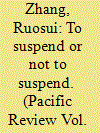

|
|
|
|
|
| Summary/Abstract |
This article investigates three Chinese multibillion overseas investment projects in Myanmar—the Myitsone dam, the Letpadaung copper mine, and the Sino-Myanmar oil and gas pipelines—over the course of three consecutive Myanmar governments. It explains why these mega-projects obtained varying degrees of success in terms of their completion and operation status and why only the dam project was unilaterally suspended following Myanmar’s controlled and peaceful power transition in 2011. Through a structured and focused comparison, this article argues that the “people’s will” is not the reason why President Thein Sein halted the Myitsone dam project, despite his claims and contrary to much scholarly research on this case. Rather, the cost-benefit calculations of Myanmar government, in particular how it weighed the urgency of national security against other costs and benefits such as appeasing or failing the domestic opposition, determine the varying degrees of success both over time and across projects. This article draws implications for the completion and operation status of Chinese overseas investment projects around the globe.
|
|
|
|
|
|
|
|
|
|
|
|
|
|
|
|
|
|
|
|
|